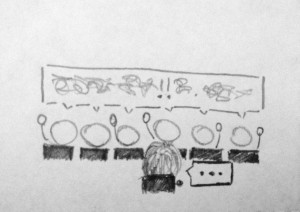Last Wednesday I enrolled in a free lecture series called
‘Ideas for the World’, hosted for students at Victoria College.
With the options of different sessions within the program, each focusing on different topics and hosted at different times, the program is an initiative to engage students in academic discussions and learning about issues in the real world, to bridge the gap between theoretical learning and practical application.
Each class has either a professor or a series of professors who come in and host discussion sessions with the students, and here’s the best part: no assignments, no grades. Class sizes are generally around 30 students and food is served, as well.
I signed up and dropped in on
Conflict in Culture, a course that explores media representation in our modern world. We watched sections of a documentary called "The Century of the Self" and then hosted a free form discussion about thoughts on what we’d just watched.
What interested me most was the degree of engagement with which the students were responding, there was some energetic discussion about topics that had surfaced in the documentary, and by discussion I mean some real back and forth dialogue.
 the enthusiastic class discussion.
the enthusiastic class discussion.
My general past experience with tutorials has mostly always involved a relatively silent group of students who participate reluctantly or sporadically. Questions raised might start with the material, but also inevitably moves to assignments, marks, and other housekeeping questions. Even a good T.A. can only do so much in circumstances like these.
The winning advantage of the Ideas for the World program for me is its complete disinterest in grading.
Students are released from the pressure to being graded on their performance and therefore their interest in the discussion at hand is motivated by other reasons. This results in less inhibition, more airing of opinions and ultimately, from my experience so far, more critical discussion.
U of T is a rigorous academic environment.
All semester the community crew has been sharing experiences and giving tips on how to make it through such a rigorous academic environment with your sanity intact.
But what if we talked more openly about how the grading system impacted our learning?
There are plenty of different responses to grades:
- Some people like the challenge, and feel their potential being unlocked as they ‘conquer’ tough assignments and achieve better grade results.
- Others feel crippled by the pressure of expectation, and the rigidity of the grading system, and are afraid they cannot meet the demands asked of them.
- There are also those who feel that grades are a box-in, reducing learning to a series of formulas that favour some, and exclude others.
- And some take the system to be inevitable and unchangeable, grades are what they are and there is nothing to be done about it.

Thinking consciously about how our grades affect our performance and expectations toward learning helps us orient ourselves better in our positions on the subject.
When we do this, we can actively and productively contribute the discussions around grading, and how they impact our experience.
What kind of response do you have?
Would you be motivated to work hard and learn without grades?
What kind of learning environment do you thrive in?
 the enthusiastic class discussion.
the enthusiastic class discussion.
0 comments on “Ideas for the U of T.”